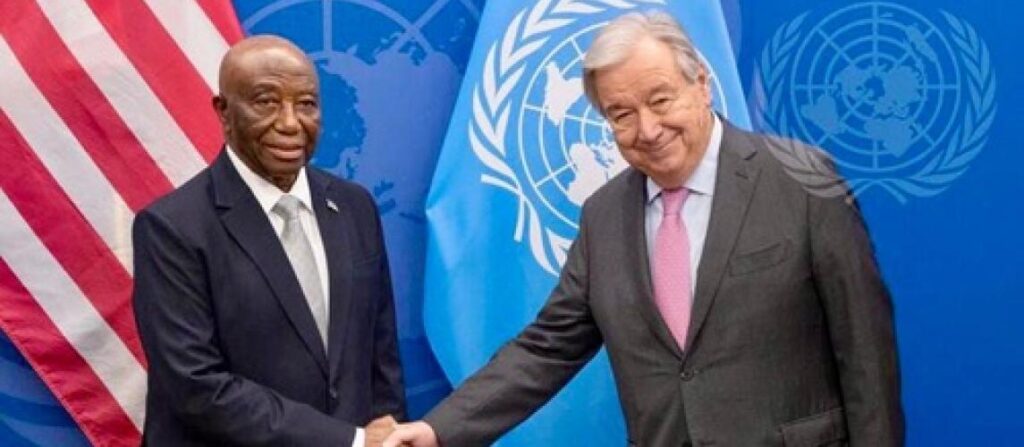As a founding member of the United Nations in 1945, Liberia happened to have been one of the few African nations which were in attendance when the global was given birth to. The others were Egypt, South Africa and Ethiopia respectively with Liberia formally joining the UN on November 2, 1945.
Since that time the relationship cum rapprochement between the multilateral organization and Liberia has been characterized by cordiality, deep respect and mutually beneficial especially within the context of the maintenance of global peace and security.
According to the Government of Liberia official press release spotted by rural reporters’ news network, Liberian President, His Excellency Joseph Nyuma Boakai has issued a call on member nations of the United Nations to support Liberia’s candidacy for a non-permanent seat on the United Nations Security Council for the 2026-2027 term.

Speaking at the United Nations Headquarters in New York, the Liberian leader highlighted Liberia’s historical legacy as a founding member of the United Nations and its precursor, the League of Nations. Furthermore, he enumerated his country’s contributions to the principles of peace, security, and human dignities, which are embedded in the country’s Constitution and reflected in its active role on the global stage.
“Liberia’s history is closely intertwined with the ideals of the United Nations. Our commitment to fostering peace, resolving conflicts, and advocating for self-determination across Africa is well documented,” the Liberian leader mentioned.
Furthermore, President Boakai then sought to historicize the major and active role Liberia played in the establishment of key continental and regional organizations, such as the African Union (AU), the Economic Community of West African States (ECOWAS), and the Mano River Union (MRU). These institutions, he noted, have played vital roles in promoting cooperation, peace, and development across Africa.
Recognizing Liberia’s turbulent past, marked by more than a decade of civil conflict, President Boakai noted that the nation’s resilience has been a powerful and true testament to its journey toward peace and reconciliation.
Said President Boakai, “Our experience in overcoming conflict equips us with unique insights into peacebuilding and conflict resolution, making us well positioned to contribute meaningfully to the Security Council’s work.”
The Liberian Chief Executive emphasized Liberia’s priorities on the global stage, particularly in regard to climate change, regional security, and sustainable development; align with the broader international agenda.
President Boakai then reiterated Liberia’s dedication to multilateralism, advocating for diverse voices in global decision-making processes.
“As a member of the Security Council, Liberia will bring a perspective shaped by our history along with our unwavering commitment to the values enshrined in the UN Charter,” he affirmed.
Meanwhile President Boakai has appealed by respectfully soliciting the support of UN member states for Liberia’s candidacy, emphasizing the nation’s readiness “To make meaningful contributions to global peace, security, and governance.”
It can be recalled that the last time Liberia served as nonpermanent member of the Security Council was in 1961 during the presidency of His Excellency William V.S. Tubman. Thus, it has been quite a long time now almost 6 decade ago.
Research wise, it is clear that the UN Security Council comprised 5 permanent and 10 nonpermanent members who are elected on rotating basis by geographic region after every two years.
The five permanent members are China, France, Russian Federation, United Kingdom of Great Britain and Northern Ireland and United States of America. Similarly, the current ten non-permanent members are Algeria, Ecuador, Guyana, Japan, Malta, Mozambique, Sierra Leone, Slovenia and South Korea respectively.
As regards their purpose and functions, the non-permanent members may be involved in global security briefings. Besides, non-permanent members have to cooperate with other powers to influence security policy. They do not have the right to veto, and if elected, they also have to represent the interests of other powers that voted for them.
With respect to benefits cum significance, the most important function of the UNSC is maintaining peace and security at the international level. It takes the lead in determining the existence of a threat to peace or act of aggression. Apart from maintaining peace, the Security Council can also deploy UN peacekeeping operations and impose sanctions on states engaged in activities that threaten global peace and international order. To conclude, below are some of the benefits of being a UNSC member:
- Being a non-permanent member of the UN Security Council provides a country with significant benefits, including increased influence and visibility on the global stage.
- Non-permanent members can play a crucial role in maintaining international peace and security by participating in global security briefings and potentially influencing the council’s decisions.
- Membership in the Security Council offers opportunities to establish networks and build relationships with other member states.
- Research notes that the competition for non-permanent seats on the Security Council can be intense, as countries recognize the substantial material and symbolic benefits associated with membership.
- This research also highlights the ongoing debate surrounding the membership of the Security Council, particularly regarding the non-permanent members.
- The document mentions that the Security Council’s role in maintaining peace and security is one of its most important functions, but the document does not mention specific examples of how non-permanent members have contributed to these efforts.
- The research is current to 2024, so it’s important to note that these information are current. It’s however recommended to consult additional sources for sufficiency of the latest information on the benefits of being a non-permanent member of the UN Security Council.



